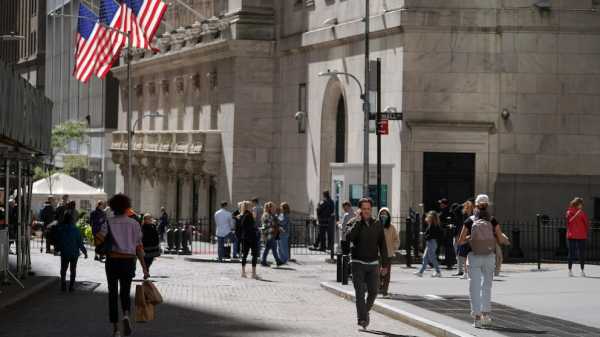
NEW YORK — U.S. stocks drifted higher in a quiet day of trading Wednesday as yields were mixed in the bond market, which has been the main driver of Wall Street’s moves recently.
The S&P 500 rose 18.71, or 0.4%, to 4,376.95 for its fourth straight gain. The Dow Jones Industrial Average added 65.57 points, or 0.2%, to 33,804.87, and the Nasdaq composite gained 96.83, or 0.7%, to 13,659.68. All three indexes moved between small gains and losses through the day.
Wall Street has been mostly struggling since the summer as longer-term yields shoot higher in the bond market, weighing on prices for all kinds of investments. Some relief has come this week, and yields have eased after officials at the Federal Reserve suggested they may be done raising their main overnight interest rate.
The yield on the 10-year Treasury fell to 4.56% from 4.66% late Tuesday and from more than 4.80% last week, when it reached its highest level since 2007. Besides hurting prices for investments, high yields have jacked up rates for mortgages and other loans, which saps momentum from the economy.
The stock market got a boost from that drop in longer-term yields, but it also felt a drag from rising shorter-term yields. The two-year Treasury yield, which moves more closely with expectations for the Fed, ticked up to 4.99% from 4.97%.
Yields were mixed after a report showed inflation at the wholesale level was stronger last month than economists expected. A report showing how much inflation U.S. households are facing will arrive on Thursday, and economists expect it to show a slowdown.
While the report on wholesale inflation was above expectations, Rubeela Farooqi, chief U.S. economist at High Frequency Economics, said it wasn’t enough to change her forecast that the Fed’s main interest rate is already at its peak.
“Fed officials are gradually taking comfort with the fact that the July rate hike may have been the last one in this historic tightening cycle,” said Gregory Daco, chief economist at EY.
Minutes from the Fed's meeting last month suggested officials see the outlook for the U.S. economy as particularly uncertain. They said they were ready to “proceed carefully” in deciding what to do next with rates.
A Fed on hold could provide some oxygen for financial markets. They’ve struggled as the 10-year yield has jumped for a few reasons, including a remarkably resilient U.S. economy that has erased some worries about a possible recession and removed expectations for the Fed to take it much easier on short-term rates.
With the U.S. government racking up big deficits, which requires more borrowing, and buyers in shorter supply, the pressure has been mostly upward on Treasury yields.
Strategists at Bank of America say it’s hard to forecast where the 10-year Treasury yield will go, but they can’t rule out a climb above 5%.
They see U.S. rates stopping their climb following clearer signs that high rates are becoming “sufficiently restrictive” to the economy. That could show itself through a moderating U.S. economy, struggles for stocks and other risky investments and a shift in commentary by Fed officials.
“Recent Fed commentary suggests concern over financial conditions; we suspect the Fed would judge another 10% decline in risk assets reflects sufficiently restrictive rates,” strategists led by Mark Cabana wrote in a BofA Global Research report.
A further pullback in crude oil prices is helping to take some heat off inflation and support Wall Street.
A barrel of U.S. crude oil slumped $2.48 to settle at $83.49. Brent crude, the international standard, fell $1.83 to $85.82 per barrel.
They've given back much of their strong gains from earlier this week, triggered by fighting in Gaza. Though the area doesn't produce much oil, the worry was that the violence could spill into the politics around the crude market and hurt the flow of petroleum.
Energy stocks in the S&P 500 fell to the sharpest losses among the 11 sectors that make up the index.
Exxon Mobil felt extra pressure after it said it would buy Pioneer Natural Resources in an all-stock deal valued at $59.5 billion. Exxon Mobil fell 3.6%, and Pioneer Natural Resources rose 1.4%.
Birkenstock stumbled in its debut on Wall Street. The maker of distinctive sandals fell 12.6% after initially pricing its stock at $46 per share, which valued the company at $8.64 billion.
In stock markets abroad, indexes were mixed in Europe and higher across much of Asia.
In South Korea, the Kospi jumped 2% after Samsung Electronics reported improved quarterly earnings. Analysts say the worst of the post-pandemic contraction in demand for computer chips and electronic devices may be over.
___
AP Business Writers Matt Ott and Elaine Kurtenbach contributed.
Sourse: abcnews.go.com






